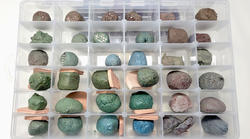Terra Carta Design Lab

RISD’s two winners of the 2024 Terra Carta Design Lab competition are BIOPOD and Shellf Life. Follow this link to read how these groundbreaking projects and the expert teams behind them are addressing today’s urgent climate and biodiversity challenges.
RISD has joined the Sustainable Markets Initiative’s Terra Carta Design Lab (TCDL) to find student- and alum-led, high-impact solutions to the climate crisis.
This global competition unites the creativity of the RISD community and the power of private sector supporters to support innovative, scalable solutions and highlight the urgent need to focus on collaboration between art, science, design and engineering.
You can view projects by the 10 RISD student and alum-led teams that advanced to the final stages of the competition on our TCDL 2023–24 finalists page.
The 2023–24 TCDL competition has concluded. There are no active calls for 2024–25 submissions.
History and context
The competition was launched in 2021 by His Majesty King Charles III, in his former role as the Prince of Wales, and Sir Jony Ive (RISD Honorary Degree ’09), in partnership with the Royal College of Art. This year, the competition includes four design schools from across the world. RISD joins as the first and only US school to participate in this endeavor, along with the Dubai Institute of Design and Innovation (UAE), the National Institute of Design (India), and the Royal College of Art (UK).
Sustainable Markets Initiative invites students and recent alums (who graduated in the last five years) from these four schools to address the damage being done to the planet and create breakthrough solutions for “Nature, People, and Planet,” inspired by a guiding mandate, epitomized in its charter, the Terra Carta.
Read more in our September 28, 2023 press release.
Competition details
Two projects from RISD have each been awarded £100,000 total in funding, as well as the opportunity to be mentored by the Sustainable Markets Initiative’s vast network to help scale their ideas and bring them to market.
Social equity and inclusion — our vision
From RISD President Crystal Williams:
“Art and design are essential to realizing a sustainable future. This global effort is an incredible opportunity for RISD students and alumni to apply the question-based inquiry approach they learn at RISD. This is also an important opportunity to help elevate and include voices and people who have been historically underrepresented in conversations about sustainability and the climate crisis. Including a range of perspectives and experiences—particularly from those most immediately affected by these challenges—catalyzes new insights, new discoveries and new solutions that benefit us all. I look forward to seeing the results from the RISD community and our global counterparts.”
Sustainability in design at RISD
Innovative design projects that encompass sustainability issues are prevalent within our creative community. Here faculty, students and staff consistently develop products, systems and services that address the needs of nature, people and planet.

Samples of violacein, a purple-pigmented bacteria harvested and used in textile dyeing by Kate Reed BRDD 21 ID
Samples of violacein, a purple-pigmented bacteria harvested and used in textile dyeing by Kate Reed BRDD 21 ID

A carbon-negative, petroleum-free raincoat made by Charlotte McCurdy MID 18 using algae-based plastic
A carbon-negative, petroleum-free raincoat made by Charlotte McCurdy MID 18 using algae-based plastic

Bioplastics made by Megan Valanidas MID 18, via a bacteria-centered design process, are made to naturally degrade over time
Bioplastics made by Megan Valanidas MID 18, via a bacteria-centered design process, are made to naturally degrade over time

Ceramics experiments by Jacob Sussman MFA 23 CR using less energy-intensive, more sustainable materials and techniques
Ceramics experiments by Jacob Sussman MFA 23 CR using less energy-intensive, more sustainable materials and techniques
In the news
-
The Art Newspaper
“Top art schools in India, UAE, UK and US join initiative to support student-led climate solutions” (Sep 28, 2023)
-
The Boston Globe
“RISD joins effort started by King Charles to put climate, people at center of business” (Oct 2, 2023, subscription required)
-
Business Green
“Terra Carta Design Lab launches latest climate solution competition” (Sep 28, 2023)
-
Wallpaper
“Terra Carta Design Lab announces second edition” (Sep 27, 2023)
Get in touch
If you have general questions about TCDL, please send us an email at partnerships@risd.edu. Use the subject line “Terra Carta Design Lab Query”.
You may also make an appointment with the below members of RISD’s TCDL team. Just click on their name to view their calendar.
- Katherine Cooper (associate director, Strategic Partnerships)
- Sara Ossana (Terra Carta program manager)